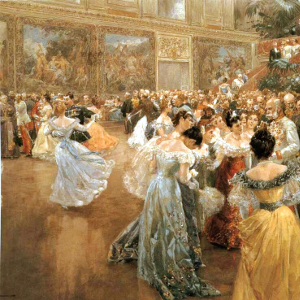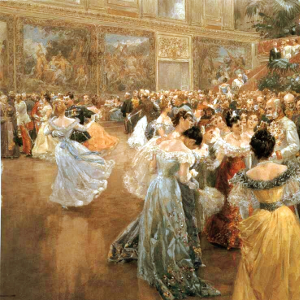
A formal dance party where different social circles mingle
Table of Contents
A ball is a formal social event which features music and dancing. Balls may differ in scale and attendance somewhat, but keep to the same rough structure and rules, and several come around every season.
Balls are especially useful as they, contrary to most social events, allow you to interact with those outside of your Social Circle, which is especially useful if you wish to get information from, or make arrangements with, someone not normally accessible to you. Unique to balls is that they allow you to interact with people outside your social circle who are of the other gender.
Due to their size, the diverse company and the chance to mingle outside of your usual social circle, balls rank amongst the most important social events.
Organization
Those organizing a ball have to arrange an orchestra to provide music, determine the dances that will take place, send out invitations, have dance cards printed, arrange for servants to attend and most importantly select who will and who will not be invited. In many cases, multiple organizers cooperate so as to pool their social circles and invite a more varied company.
The host and hostess, often one of the organizers and their spouse, provides a ball room large enough for dancing, and takes care of certain duties during the event itself.
Invitation
Most balls are by invitation. The organizers of the ball write a personal invitation to everyone whom they wish to invite, at least one month in advance being the norm. It is customary to invite everyone in a nest, so if an entire nest save one is invited, this should be taken as either a direct insult or a response to an insult by the person who wasn't invited.
Invitations are accompanied by a dance card, which lists the dances that will be held, allowing the guests to make sure they know those dances, as well as plan out whom they are going to dance with. RSVP's are mandatory if you want to be invited again next time.
Open Ball
Some balls are “open to all”. An “open” ball does not have invitations, but rather is announced and people can choose to attend or not.
Note however, that the term “open to all” should be taken with a grain of salt, because it most certainly does not mean “all”. “All” here is meant to imply “All within the relevant group”. The context of the announcement should make it clear which group is intended, though it is accepted that when it is unclear, those who were confused will be welcomed.
Notably, you are allowed (even encouraged) to bring interesting guests to an Open Ball, though if you bring Kine, they should be In-the-Know.
Clothing
Balls are an opportunity to show some creativity in outfits and appearing in the right or wrong outfit can make all the difference in your social encounters during the event. It may even affect future invites if you dress particularly well (or particularly badly) and as such should not be underestimated!
Ladies: Ladies should wear floor length gowns with wide skirts and should be of a light colour. Bare shoulders are allowed during a ball, but gloves should be worn at all times. Hair ornaments should be added to match the gown, and can be flowers, ribbons, veils etc, but beyond that, little jewellery should be worn.
As a practical consideration, if the gown has a trail, it should be designed so it can be held during dancing, or someone will step on it by accident. Finally, within upper class society it is expected that gowns worn to a ball are new and not worn before. If you cannot afford a new gown for the ball, you are expected to send your regrets.
Gentlemen: Gentlemen should wear a black dress-coats with a vest of the latest cut with matching pants and white shirt. A crevat should be worn, as well as white gloves (never a different colour). Boots or shoes can be worn and a low heel is acceptable, but not necessary, on either. A handkerchief or flower can be worn on the top pocket of the jacket, though jewellery should be kept limited.
A man who holds a military position may also wear their dress uniform. It is generally designed with exactly this kind of occasion in mind. Naturally it is completely unacceptable to wear anything that shows signs of wear or damage.
Dancing
During a ball as in many social occasions, there is an opportunity to converse in small groups from your social circle, and you can make casual, polite conversation with friends of friends if they happen to pass by.
However, unique to the ball, you can get an opportunity to talk business in a private manner with those who are not in your social circle. While dancing, you can have quiet conversation to exchange idea's and talk about both business and pleasure. This can get you access to information from people who are knowledgeable about certain things, allow you to share and hear gossip from beyond your own social circle, make deals for training, etc.
Finding a dance partner
If you arrived with a partner of the other gender, the first dance is always danced with them. After that, men ask ladies to dance, never the other way around. The only exception is that the hostess has the right to designate a dance as “ladies ask the gentlemen”, though this right is rarely invoked.
Asking to dance should be done ahead of time, that is, before the dance starts. A gentleman usually asks for the next dance coming up when the current one is finished, but for popular ladies, he may need to settle for the one after that. This is where dance cards come in handy to plan out who will be danced with when. One should never join a dance already in progress.
When a gentleman asks to dance with a lady who is not in his social circle, there should be a brief introduction, preferably by a mutual friend, but a gentleman can even introduce himself. Note however that this is not the same as a formal introduction, and holds only for the ball. It does not imply they are now within one another's Social Circle, and you are not obligated to do as they request, but you are obligated to listen to what they have to say.
When a gentleman asks a lady to dance in a polite manner, she cannot refuse his request, whether she likes him or not. The only exception is if she has already been promised to another for a dance before him. In that case she has to offer a later dance if she has them available, and only if she does not have any available within a reasonable time-frame, can she redirect him to one of her friends who is looking for a partner.
The (male) host of the ball is responsible for making sure that all ladies are danced with regularly. If anyone is having trouble finding partners, the host may request a gentleman to ask a specific lady for a dance. A gentleman cannot refuse this request from the host and moreover is expected to do this without giving a hint that he was asked to do so.
Gender of the partner
It is customary to dance with a partner of the other gender - especially since those are usually the most difficult to get a hold of outside your social circle. If there are fewer gentlemen than ladies or vice versa, it is permissible to dance with a partner of the same gender.
However, a same-gendered partner may never be given precedence over a cross-gendered one. For example, if a lady sees there are too few men and offers to dance with another lady, she may have to give her regrets to that lady later on if a gentleman does ask her for the next dance.
If you wish to get information or make deals with members of the same gender, it is customary to use a go-between, and most will be glad to take that task upon them - even if some may do that for no other reason than that they will then know what is going on.
Leaving the ball
Leaving the ball should be done as quietly as possible, without saying goodbye's or bothering the host or organizers (who will likely be busy with other matters).
Ladies face one special restriction when leaving the ballroom - they shouldn't do so on their own. The correct way of leaving is to do so with one or two other ladies (no more), at least one of whom should be married. If necessary, the hostess can help, but it is impolite to ask, so the lady should wait until the option is offered to her.
It should be noted that this restriction is not all that strict and as such is always observed. More than one lady has snuck off on her own. Doing that too often however, or not stealthily enough, could earn a lady a reputation for impropriety.
All guests of a ball should send a letter to the host within a week after the ball to give thanks. Failure to do so is a signal to the host that you had a rotten time and would rather not be invited again.

